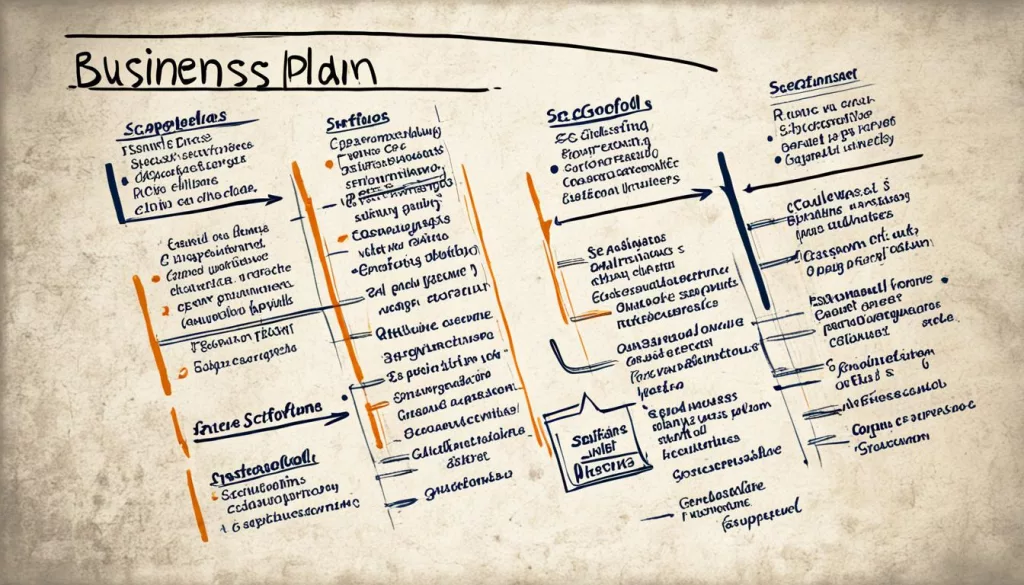Starting an online business can be an exciting and rewarding venture. However, it requires careful planning, strategic decision-making, and the right resources to ensure success. In this article, we will explore five essential resources that can help streamline your online business journey and pave the way for sustainable growth and profitability. Whether you’re looking to build a new online business or enhance an existing one, these resources will provide valuable guidance and support.
Building an online business can be an overwhelming task, especially for those who are new to the digital landscape. With so many tools, tips, and guides available, it’s important to have a clear understanding of where to start and what resources to rely on.
From validating your business idea to developing a comprehensive business plan, choosing an effective business name and structure, handling legal tasks and compliance, and creating a strong online presence, each step plays a crucial role in shaping your online business success.
To help you navigate this journey, we have curated five essential resources that cover these key areas. These resources will provide valuable insights, actionable tips, and expert guidance to help you build a solid foundation for your online business.
Join us as we explore these essential resources in detail and discover how they can contribute to the growth and success of your online business.
**Key Takeaways:**
– Validate your business idea by conducting market research and determining if there is sufficient market demand.
– Develop a comprehensive business plan that outlines your objectives, target market, and marketing strategies.
– Choose an effective business name and structure that aligns with your goals and meets legal and tax requirements.
– Handle legal tasks and compliance by registering your business, obtaining necessary permits and licenses, and meeting tax obligations.
– Create a strong online presence by developing a user-friendly website, choosing reliable web hosting services, and implementing efficient fulfillment methods.
Follow these essential resources to build your online business and set yourself up for long-term success.
Assessing the Viability of Your Business Idea
Before diving into an online business, it’s crucial to assess the viability of your business idea. Conducting market research and performing a thorough evaluation will help you determine if your idea has the potential to succeed in the online marketplace.
Market research is a key component of assessing your business idea. It involves gathering data and insights about your target market, competitors, and industry trends. By understanding customer needs, preferences, and pain points, you can tailor your product or service to meet their demands.
“Market research is a critical step in assessing the feasibility of your online business idea,” emphasizes Emily Smith, a successful online entrepreneur.
Ask yourself important questions during the evaluation process:
- Does your product or service solve a problem that enough potential customers have?
- Is your solution cost-effective and superior to existing alternatives?
- Are people willing to spend money on your product or service?
This critical step helps validate your business idea and provides insights into the market demand for your product or service. It also allows you to identify any potential challenges and make informed decisions to mitigate risk.
Philip Johnson, an experienced online business owner, advises, “By assessing the feasibility of your business idea, you can avoid investing time and resources into a venture with limited market demand.”
Market validation also involves testing your product or service with a target audience. Consider conducting surveys, focus groups, or beta testing to gain valuable feedback and refine your offering based on user insights.
By evaluating your business idea and conducting thorough market research, you can determine if your online venture has the potential for success. Understanding your target market, assessing product-market fit, and collecting valuable feedback will help shape your online business strategy and increase your chances of achieving profitability.
Stay tuned for the next section where we dive into developing a comprehensive business plan to guide your online business endeavors.
Developing a Comprehensive Business Plan
Once you’ve validated your business idea, it’s essential to develop a comprehensive business plan. This plan will serve as your roadmap, helping you clarify your objectives, identify your target market, and devise effective marketing strategies. It also allows you to anticipate potential challenges and plan for future growth and profitability.
Creating an online business plan is crucial for mapping out the steps needed to build and grow your enterprise. By outlining your business goals, strategies, and financial projections, you can establish a clear path towards success.
Key Components of an Online Business Plan
A well-written business plan typically includes the following sections:
- Executive Summary: Provide an overview of your business and its objectives. This section should highlight the unique value proposition of your online business and set the tone for the rest of the plan.
- Market Analysis: Conduct research on your target market, including customer demographics, trends, and competitors. Identify your target audience’s needs and preferences to develop effective marketing and sales strategies.
- Product or Service Description: Clearly define the products or services you offer. Explain how they meet the needs of your target market and differentiate your business from competitors.
- Marketing Strategy: Outline your marketing and promotional activities. Include details on your online advertising, social media strategies, content marketing, and SEO efforts.
- Operational Plan: Describe the day-to-day operations of your online business. Address topics such as supply chain management, inventory control, customer support, and fulfillment processes.
- Financial Plan: Present a detailed financial analysis, including startup costs, revenue projections, and profit margins. This section should also outline your pricing strategy, budgeting, and funding requirements.
- Risk Assessment: Identify potential risks and challenges that could impact your business. Develop contingency plans to mitigate these risks and ensure business continuity.
Developing a comprehensive business plan helps you gain a deeper understanding of your target market, competitive landscape, and potential challenges. It provides a strategic roadmap for your online business, enabling you to make informed decisions and maximize profitability.

Example Business Plan Financial Projection
| Year 1 | Year 2 | Year 3 | |
|---|---|---|---|
| Sales Revenue | $100,000 | $250,000 | $500,000 |
| Cost of Goods Sold | $50,000 | $125,000 | $250,000 |
| Gross Profit | $50,000 | $125,000 | $250,000 |
| Operating Expenses | $30,000 | $50,000 | $75,000 |
| Net Profit | $20,000 | $75,000 | $175,000 |
This financial projection demonstrates the potential growth and profitability of your online business over the first three years. It highlights the sales revenue, cost of goods sold, gross profit, operating expenses, and net profit for each year.
Developing a comprehensive business plan sets the foundation for your online business’s success. It provides a roadmap for achieving your objectives, implementing effective marketing strategies, and ensuring long-term profitability.
Choosing an Effective Business Name and Structure
When establishing an online presence, selecting the right business name and structure is of utmost importance. A well-chosen business name helps create brand recognition and leaves a lasting impression on customers. The business structure, on the other hand, determines the legal and financial aspects of your venture. Let’s explore how to make these vital decisions.
Choosing the Perfect Business Name
To begin, brainstorm several potential names that reflect your business’s identity and resonate with your target audience. Consider the following tips to ensure you make the right choice:
- Availability: Check the availability of the business name as a domain, social media username, and a registered business name. Ensuring consistency across these platforms will make it easier for customers to find and recognize your brand.
- Variations: Explore different variations of your chosen name, such as abbreviations or the inclusion of relevant keywords, to increase search engine visibility.
- Trademark Conflicts: Conduct a thorough search to verify that your chosen name does not infringe upon any existing trademarks. This will help prevent legal complications in the future and protect your brand identity.
Keep in mind that your business name should align with your target market and reflect your brand’s values and offerings. It should be memorable, unique, and evoke a positive emotional response from customers.
Choosing the Appropriate Business Structure
Once you have chosen a business name, it’s crucial to determine the appropriate business structure. There are several options to consider, including:
| Business Structure | Description |
|---|---|
| Sole Proprietorship | A business owned and operated by a single individual. It offers simplicity and full control over the business’s operations, but the owner assumes full personal liability. |
| LLC (Limited Liability Company) | A hybrid business structure that combines elements of a corporation and a partnership. It provides liability protection for owners while offering flexibility in management and tax advantages. |
| Corporation | A separate legal entity from its shareholders. It offers liability protection and allows for the issuance of shares to raise capital. Corporations have more complex legal and tax requirements. |
The choice of business structure depends on factors such as the level of personal liability you are comfortable with, tax considerations, and your long-term business goals. It’s always advisable to consult with legal and financial professionals who can provide guidance tailored to your specific circumstances.
By carefully selecting an effective business name and structure, you can establish a strong online presence and lay a solid foundation for the success of your online business.
Handling Legal Tasks and Compliance
Ensuring your online business has a solid legal foundation is crucial for long-term success. To achieve this, you need to handle various legal tasks and comply with relevant requirements. This includes:
- Business registration: Registering your online business is an essential step to establish its legal identity. Research the appropriate registration process for your industry and locations, which may involve registering with state authorities or obtaining a federal Employer Identification Number (EIN).
- Permits and licenses: Depending on the nature of your online business, you may need specific permits or licenses to operate legally. Research local and industry-specific requirements to ensure compliance. Examples include health permits for selling food products or licenses for offering professional services.
- Tax requirements: Meeting tax obligations is essential for your online business’s legal and financial health. As an online business owner, you may need to navigate federal and state tax laws, including sales tax, income tax, and reporting requirements. Consulting with tax professionals can help ensure compliance and minimize risks.
- Legal foundation: Building a strong legal foundation involves engaging professional advice. Consult attorneys who specialize in business law to draft contracts, terms of service, and privacy policies specific to your online business. They can also provide guidance on intellectual property protection and employment laws.
By addressing these legal tasks and complying with relevant regulations, you can safeguard your online business and create a trustworthy and legally compliant environment for your customers.
| Legal Task | Importance |
|---|---|
| Business Registration | Establishes legal identity |
| Permits and Licenses | Ensures compliance with local regulations |
| Tax Requirements | Meets legal obligations and avoids penalties |
| Legal Foundation | Protects business interests and assets |
Remember, legal compliance is a crucial aspect of running an online business. Failure to comply with legal requirements can lead to severe consequences, such as fines, legal disputes, or even the closure of your business. Seek professional advice to navigate the complex legal landscape and ensure your online business operates within the boundaries of the law.
Next, we’ll explore the importance of creating a strong online presence with a user-friendly website and efficient fulfillment methods.
Creating a Strong Online Presence with a Website and Fulfillment Methods
To establish a robust online presence for your business, it is crucial to focus on two key aspects: website development and fulfillment methods. By prioritizing these areas, you can enhance customer experience and streamline operations.
Website Development
A user-friendly website is a vital tool for attracting and engaging potential customers. It serves as the virtual face of your business and showcases your products or services. When developing your website, consider the following:
- Design and Layout: Ensure your website is visually appealing and aligns with your brand identity. Use clean and intuitive navigation to facilitate easy browsing.
- Mobile Responsiveness: Optimize your website for mobile devices, as an increasing number of consumers browse and make purchases on their smartphones and tablets.
- Content: Create informative and engaging content that highlights the benefits of your offerings and addresses customers’ pain points.
- Search Engine Optimization (SEO): Implement SEO strategies to improve your website’s visibility in search engine results, driving organic traffic to your site.
Remember, a well-designed and functional website can leave a lasting impression on visitors and contribute to the success of your online business.
Fulfillment Methods
Efficient fulfillment methods are essential for ensuring timely product delivery and customer satisfaction. Consider the following factors when selecting your fulfillment methods:
- Inventory Management: Implement robust inventory management systems to track product availability, prevent stockouts, and streamline order processing.
- Payment Processors: Choose reliable and secure payment processors that offer seamless integration with your website, providing a smooth checkout experience for customers.
- Shipping and Delivery: Evaluate different shipping options and carriers to determine the most cost-effective and reliable methods for delivering your products to customers.
By ensuring efficient inventory management and seamless order processing, you can meet customer expectations and establish a reputation for reliable and timely deliveries.

Through careful consideration of website development and fulfillment methods, you can create a strong online presence that attracts customers, drives sales, and fosters long-term success for your online business.
Conclusion
In summary, building a successful online business requires careful planning, market research, and strategic decision-making. By utilizing the necessary resources and following a systematic approach, aspiring entrepreneurs can establish a solid foundation for online business success.
Throughout the journey, it is important for online business owners to remain adaptable and continuously refine their strategies to keep pace with the ever-evolving digital landscape. This includes staying updated on the latest online marketing techniques and leveraging them to reach and engage with their target audience effectively.
Entrepreneurship in the online realm presents numerous opportunities for growth and profitability. However, it is essential to approach the venture with dedication and perseverance. Success in the online business world does not happen overnight, but with consistent effort and a commitment to delivering value to customers, long-term success is achievable.
Entrepreneurs should embrace the journey of building an online business with enthusiasm and a willingness to learn. By using the right resources and making informed decisions, they can overcome challenges and navigate the competitive landscape, carving a niche for themselves and establishing a thriving online business.
FAQ
What is the first step in building an online business?
The first step is assessing the viability of your business idea through market research and validation.
Why is a comprehensive business plan important for an online business?
A business plan helps clarify objectives, identify the target market, and devise effective marketing strategies.
How do I choose an effective business name and structure for my online business?
Ensure that your chosen name is available and consider different variations. Determine the appropriate business structure that aligns with your goals.
What legal tasks and compliance requirements do I need to handle for my online business?
This includes registering your business, obtaining permits and licenses, and meeting tax obligations.
How can I create a strong online presence for my online business?
Start by creating a user-friendly website, choosing reliable web hosting services, and considering secure sources of supply and inventory.
What resources can help me build a successful online business?
Resources such as market research tools, business planning software, legal support services, and online marketing guides can be valuable in building an online business.





